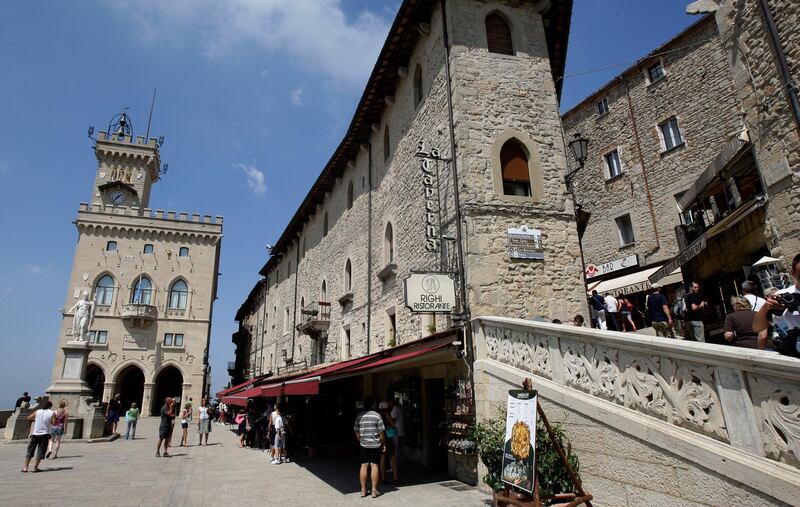On a sunny day during an unprecedented heatwave at the end of June, a group of businessmen were sitting together on the luxurious garden terrace of the Rimini Grand Hotel, facing the sea and the Italian Riviera. Immortalised by director Federico Fellini in his film Amarcord, the glamorous hotel was the location for this unusual meeting between the Saudi Arabian entrepreneur Mohammed Ali Turki and the Italian businessmen Marino Grandoni and Daniele Guidi. The meeting was unusual because the talks between the parties related to a troubled bank named Credito Industriale Sammarinese (CIS). Founded in 1980 and one of the 4 biggest local banks in San Marino, CIS was weighed down by about €110 million (Dh479m) in bad loans.
_______________
Read more from Simone Filippetti:
[ How Qatar is seducing Italy ]
[ Reliance on Qatari investment leaves Italy in quandary ]
[ Blame Alitalia’s employees for this latest scary scenario for the airline ]
______________
For months, the loss-making bank had been seeking a white knight to avoid serious trouble in the near future. Even if the people at the discussion table were technically inside Italian jurisdiction, they were dealing with a foreign policy matter.
CIS bank is not exactly an Italian bank; it is located in the Republic of San Marino. Nestled on the top on a rocky peak within the countryside around Rimini, it is one the smallest countries in the world. It is completely surrounded by Italy, just like the Vatican City State. Similar to the crumbling Italian banking system - which has suffered 7 banks going bankrupt in the last 2 years, including Monte dei Paschi, the oldest bank in the world - San Marino's credit industry is underwater as well.
Referred to as the "happy island" during the 1980s, the republic has for decades been a safe harbour for Italian money. But now the micro-state has suffered from a severe financial crisis: its government has warned that about €500 to €600 million in capital is needed for local banks. They have been overwhelmed by about €2bn of bad assets out of €7bn of total market funding. Thanks to these non-performing loans, San Marino banks experienced, for the first time in the country’s history, net capital outflows.
In September, it was announced that Mohamed Ali Turki was buying CIS.
"It's a good deal for the bank, otherwise we wouldn't have done it" said Mr Grandoni, who led the sale. Mr Turki is a Saudi businessman who runs an industrial group in the Middle East. He is chief executive and chairman of MTMM, a Saudi-UK engineering joint venture with a vastly diversified portfolio including facilities management, oil and gas services, and water treatment.
"The idea about finding this kind of partner comes from admitting the [San Marino] banking system is now under pressure. We needed a big jump towards internationalisation and we needed a big name from outside the European investors market. EU banks were not interested in investing in our country. In this scenario, a Saudi investor was absolutely compliant with our needs," said Mr Grandoni.
Representatives of investors from Egypt, Bahrain and Turkey were also in the running to buy CIS, it is understood. Mr Turki’s investment in an "Italian" bank was probably made easier by the fact that the San Marino central bank governor is Wafik Grais, an Egyptian former World Bank official. He had been appointed last year to help clean up the mess the banking system has found itself in.
The CIS sale, under the San Marino law, requires central bank approval. Mr Turki also seems to have a special relationship with Italy. He has a home in Turin, the northern Italian city that is home to Juventus football club and car maker FCA. Turin is also developing its Islamic finance sector and has the only sharia-compliant hospital in Italy. Mr Turki spoke at the Islamic Finance Italian Conference in Turin last march that was organised by Turin University, which has an Islamic finance research centre run by a professor Paolo Biancone.
All seemed set, then, for things to move forward for San Marino's troubled banks. Not at all. Soon after Mr Turki's investment, a new problem arose in the state. A few weeks ago the San Marino central bank's general manager, Raffaele Capuano, resigned after taking on the role just two months earlier, following the resignation of his predecessor. They both left because of the critical situation in San Marino - CIS was the territory's least troubled bank. The two bigger issues, CariSanMarino (RSM Savings Bank) and Asset Banca, together account for €450m in write-offs that threaten to sink the republic's entire banking industry.
Simone Filippetti is a finance & economy reporter at Italian daily newspaper Il Sole 24 Ore






